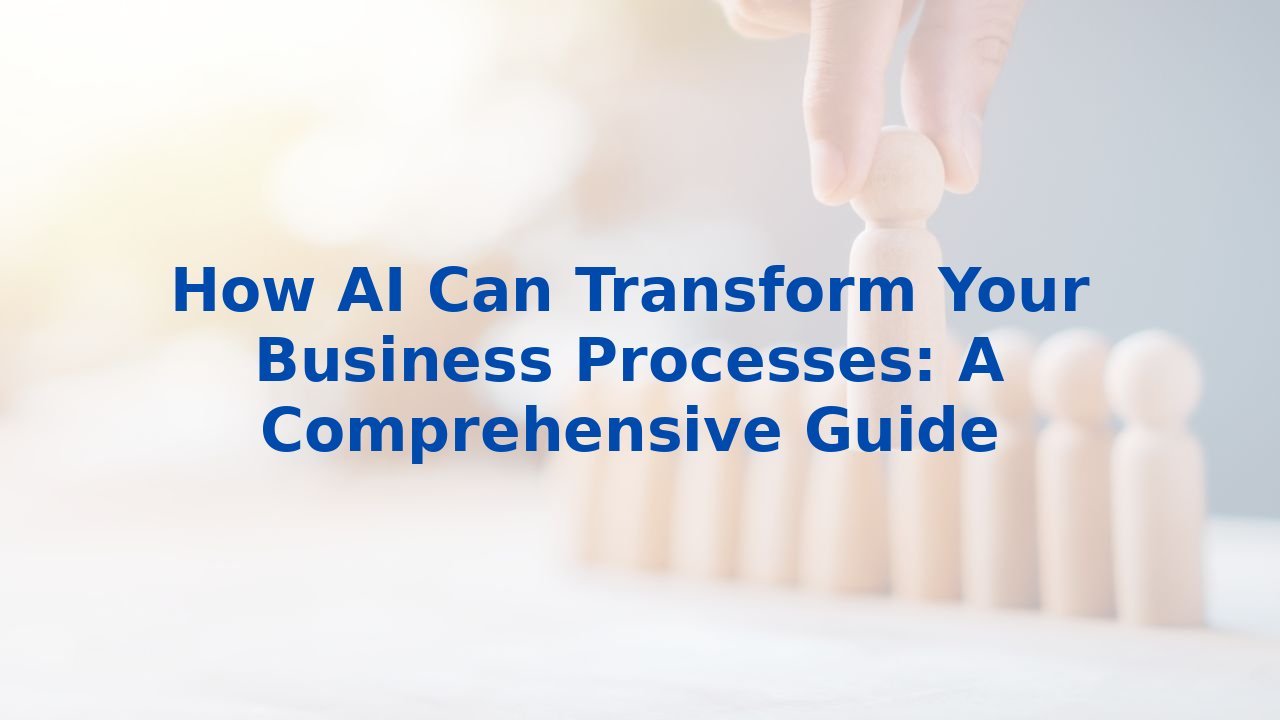How AI Can Transform Your Business Processes: A Comprehensive Guide
How AI Can Transform Your Business Processes: A Comprehensive Guide
Introduction
In an era where innovation drives competition, the integration of Artificial Intelligence (AI) into business processes represents a turning point. AI isn't just a buzzword; it's a catalyst for efficiency and productivity. This guide will unpack how AI can improve various business processes, the immense benefits it offers, and the undeniable importance of training employees to embrace this powerful tool.
Enhancing Business Processes with AI
At the heart of any organization lies a series of interconnected processes that facilitate its operations. By leveraging AI, companies can enhance these processes in meaningful ways. Here are a few key areas where AI makes a significant impact:
- Content Creation: AI can produce high-quality content at speeds that far exceed human capabilities. This efficiency reduces the workload on writers and editors, allowing creative minds to focus on strategy rather than mundane tasks. From generating articles to crafting marketing copy, AI can support the creative process while maintaining a consistent voice.
- Customer Service: Picture a world where customer inquiries are handled 24/7 by AI-powered chatbots. These digital assistants not only respond immediately but also learn from interactions to provide increasingly tailored responses. By alleviating the workload from human representatives, organizations can ensure that complex inquiries receive the attention they deserve, while customers enjoy timely support.
- Data Analysis: In a data-driven society, the ability to process and interpret vast amounts of information is crucial. AI excels in data analysis, offering insights that inform strategic decisions. With predictive analytics capabilities, businesses can anticipate market trends, allowing them to pivot swiftly and maintain a competitive edge.
- Marketing and Advertising: The era of one-size-fits-all marketing is long gone. AI takes personalisation to the next level by analyzing customer behavior and preferences. This data-driven approach results in targeted marketing campaigns that resonate with consumers, ultimately increasing engagement and sales.
Benefits of AI for Improving Efficiency
The impact of integrating AI into business processes goes beyond enhancing individual tasks. Here are some overarching benefits:
- Increased Productivity: With AI handling repetitive tasks such as data entry and report generation, human resources are freed up to explore strategic initiatives that demand creativity.
- Improved Accuracy: The precision with which AI performs tasks ensures a reduction in human error — a fact that pays dividends in quality control and reliability.
- Enhanced Customer Experience: AI-driven solutions can personalize every interaction, leading to a significant boost in customer satisfaction and loyalty as customers feel genuinely understood.
- Cost Savings: By automating tasks previously handled by humans, businesses not only reduce labor costs but also streamline operations, resulting in substantial savings over time.
The Importance of Training Employees for AI
Despite the myriad of advantages AI offers, integrating it successfully into an organization isn’t simply about implementing technology; it’s about empowering people. Training employees to collaborate with AI is paramount for harnessing its full potential:
- Understanding AI Capabilities: Employees must grasp both the abilities and limitations of AI tools to engage with them effectively. This knowledge fosters greater innovation in how these tools can be applied.
- Formulating Effective Prompts: Properly crafting requests for AI systems is akin to setting clear expectations for a team member. Training in prompt engineering allows employees to articulate their needs, resulting in more relevant and useful outputs from AI.
- Evaluating Output: Just because AI delivers results doesn't mean they’re always spot-on. Training helps employees critically assess AI-generated content, ensuring that it aligns with business goals and quality standards.
- Integrating AI into Workflows: Seamless integration is essential. When employees understand how to weave AI into their daily operations, it maximizes the tool’s benefits and enhances overall productivity.
Conclusion
Incorporating AI into business processes unlocks a treasure trove of benefits — from increased productivity and improved accuracy to enhancing customer experiences. However, the journey to harnessing AI’s true power lies in cultivating a workforce equipped with the necessary skills and knowledge. By investing in employee training, organizations can seamlessly integrate AI, transforming it from a technological advance into a powerful partner in achieving success.
If you’re ready to empower your workforce and explore further training opportunities, consider checking out resources available for institutions aiming to equip their teams with AI skills.



